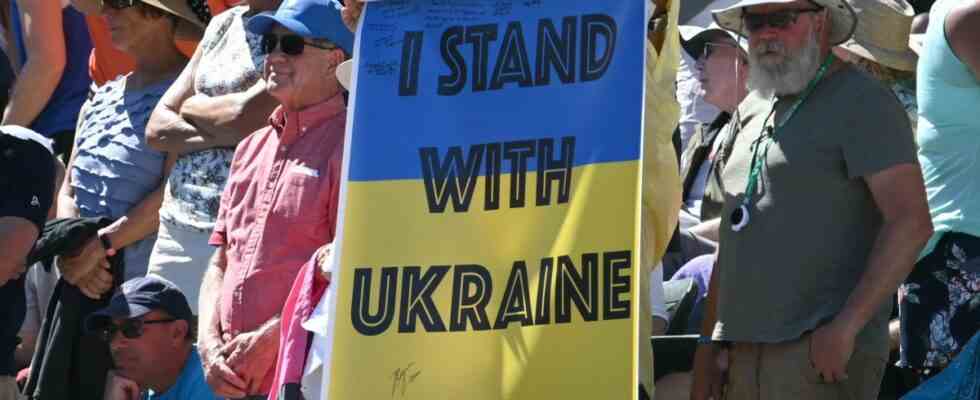For Angelique Kerber, talking to journalists is like the corridor from the changing room to the pitch – you have to go through it in a tournament like this. She has perfected the art of talking a little bit about the same phrases (“play my game”, “follow my plan”) without saying much. But this week, at the tournament in Indian Wells, the corridor turned into a platform. The best German tennis player wanted to say something and she had something to say.
She had won 6-2, 6-1 against Daria Kasatkina – it wasn’t just any game. Kerber’s grandparents are Polish citizens, she lives in Puszczykowo – and she also noticed in California that there had been air raids in the border area with Poland during the Russian war of aggression against Ukraine. Kasatkina is Russian and Kerber previously said she didn’t know what kind of game it would be for her. So, ask afterwards: How was it?
“Tennis is secondary for me at the moment given what is happening in the world right now,” said Kerber: “There are people who are fleeing, who are scared, who are worried. I don’t live far from the situation myself, my grandparents are there “Of course you check the news every five minutes. Tennis is second, third, fourth and I deliberately flip the switch late when preparing for a game.”
Against Kasatkina, Kerber wore a bow in the Ukrainian national colors on her peaked cap. The flag of Ukraine now flies above the scoreboard in the stadium. The billionaire and tournament owner Larry Ellison wore a Ukraine cap, actors like Jannik Sinner (Italy) and Coco Gauff (USA) dressed in yellow and blue, others like Garbine Muguruza (Spain) or Iga Swiatek (Poland) wore the yellow -blue ribbons. Elina Switolina posed between training pitches wearing an Ape Kids Club shirt: a sad cartoon monkey stands in front of a glowing peace sign and holds up the Ukrainian flag.
“Look at other sports, what they have done!” Ukrainian tennis player Elina Svitolina does not agree that Russian players can continue to compete in tennis.
(Photo: Radka Leitmeritz/oh)
Switolina puts her hands on her hips, her eyes serious. She is Ukrainian. Having lost her first game at Indian Wells, she now supports husband Gaël Monfils, who defeated top seed Daniil Medvedev on Monday. Her family is just holding out in a basement in Odessa, and sport is also playing a minor role for Switolina. Although, that’s important to her: she doesn’t agree that Russian actors are allowed to play in Indian Wells; albeit without a Russian flag next to the names: “I don’t think that’s right. Look at other sports and see what they’ve done!”
Professional tennis plays a special role in this topic – again. And the sport doesn’t cut a good figure – again.
A few other examples: Alexander Zverev is still running an ATP investigation into allegations of domestic violence (which Zverev, who claims his innocence, expressly welcomes), but after half a year there is still no information from the men’s association about the status. What it is gives: The information from a well-informed source that so far no one has asked the alleged victim for a statement or evidence. The penalty for Zverev’s freak out recently in Acapulco when he abused the referee’s chair with his racket: ridiculous. Zverev can do neither for investigations in slow motion nor for the mild punishment; However, both give the impression that the ATP treats both like this corridor: somehow quickly through.
Ukrainian Marta Kostjuk says the statements have no substance
Or the state affair surrounding the Chinese woman Peng Shuai, who has disappeared in the meantime and for whom it is still not really clear how she is doing. The women’s association WTA has therefore canceled all tournaments in China. There are four men’s tournaments in China this fall, including the Masters in Beijing.
Or the tears of former world number one Naomi Osaka at the weekend because she was insulted by a spectator. She felt reminded of the racist calls against Venus and Serena Williams in 2001, Osaka said afterwards – the tournament in Indian Wells had long had the stigma of not having done enough against such calls. Anyone who now asks for a statement on the Osaka case waits in vain for an answer. But the main thing is that the Ukraine flags are flying, there’s champagne over there, dear viewers.
The Ukrainian Marta Kostjuk plays in national colors.
(Photo: Clive Brunskill/AFP)
The symbolism is overwhelming, so it hardly affects you. “All the ‘No War’ statements hurt me because they have no substance,” says Ukrainian Marta Kostyuk, whose family is in Kyiv. Russia’s Daniil Medvedev, the world number one in men, made such a general “no war” statement, but what was he supposed to say? The most meaningful sentence comes from Daria Gavrilova. She was born in Moscow and now plays for Australia. Her answer to the question about the war: “I have family in Moscow.”
Tennis has a special role in world sport. The actors are world-traveling I-AGs, the top 20 in the world for women and men play for a total of 21 nations. There are WTA and ATP tournaments in 36 countries. And: there are too many associations with their own interests – the world association ITF; WTA and ATP; the four Grand Slam tournaments – sport almost never speaks with one voice. Often it’s just about keeping your own traveling circus going. Now with a yellow-blue flag at the tent.

